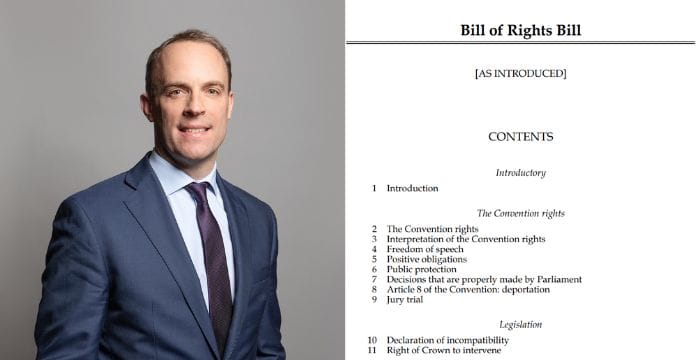New Justice Sec also agrees to meet with striking criminal barristers

The government’s planned reforms of the 1998 Human Rights Act have been shelved whilst “the most effective means to deliver objectives through our legislative agenda” is being mulled over by the new Truss administration.
Reforming the Human Rights Act was a pet project of the former Justice Secretary and ex-Linklaters trainee Dominic Raab which came to fruition during his stint as Lord Chancellor when he proposed the Bill of Rights Bill. The Bill would have repealed the Human Rights Act 1998 and introduced a new permission stage for human rights challenges.
The objective of the Bill was, according to the former Justice Secretary’s statement in Parliament, to “reinforce quintessential UK rights”. The proposed legislation had received a strong response from several prominent lawyers and MPs including Raab’s predecessor Robert Buckland who indicated that the Bill needed to be reviewed.
In July, Lord Pannick QC told the Joint Committee on Human Rights: “If this Bill were being sold in the shops the Lord Chancellor, in my view, would be at risk of prosecution for false or deceptive advertising.”
On Tuesday, Raab was sacked from his position at Lord Chancellor and Justice Secretary by Liz Truss with the PM’s new administration being quick scrap the former Linklaters’ man’s plans.
On the news that the Bill had been shelved, Law Society President Stephanie Boyce took to Twitter to share her relief. She wrote: “The Bill needs a complete rethink, the current draft represents a lurch backwards for British justice which would disempower people in Britain while giving the state more unfettered authority.”
Prominent legal commentator David Allen-Green tweeted: “The Human Rights Act 1998 is still there. And @DominicRaab is not”. Allen-Green then stated that the ex-Justice Sec’s account had blocked his Twitter account (@law_and_policy) in response to the Tweet.
In the comments the best-selling author the Secret Barrister noted that he too was blocked by Raab’s Twitter account. The Secret Barrister has been critical of the way Raab has handled tensions between the Ministry of Justice and criminal barristers with a recent escalation culminating in the launch of an indefinite, uninterrupted strike on 5 September by Criminal Bar Association (CBA).
Raab’s replacement Brandon Lewis is set to meet with the CBA next. Lewis announced on Twitter: “Hundreds more victims seeing justice delayed – these statistics show the impact of the Bar strike. I’ll be meeting @thebarcouncil @TheLawSociety @TheCriminalBar to emphasise the need to get back to work and get justice moving again.”
Kirsty Brimelow, Chair of the CBA, commented: “I look forward to meeting the Lord Chancellor and hope this introductory meeting urgently will be followed by opening of negotiations to resolve the criminal barristers’ action of stopping work on cases as a result of the crisis in the CJS [Criminal Justice System]”



